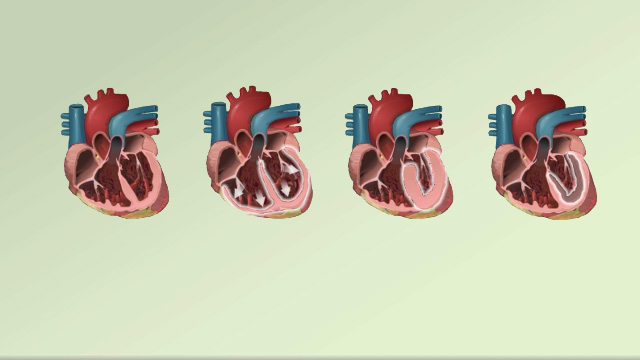Dilated cardiomyopathy (DCM) is a serious heart condition characterized by the enlargement and weakening of the heart muscle, primarily affecting the left ventricle, which is the heart’s main pumping chamber. This condition leads to a reduced ability of the heart to pump blood effectively, resulting in various complications, including heart failure. DCM can occur in individuals of all ages but is most commonly diagnosed in adults between 20 and 60 years old. The prevalence of DCM is estimated at approximately 1 in 250 individuals, with a higher incidence in men compared to women.
Pathophysiology of DCM
In DCM, the heart muscle becomes dilated and thin, impairing its ability to contract. As the left ventricle enlarges, it can no longer pump blood efficiently, leading to an accumulation of fluid in the lungs and other parts of the body—a condition known as heart failure. The dilation of the heart chambers affects not only the left ventricle but may also involve the right ventricle and atria over time.
The heart’s inability to pump effectively can result in symptoms such as fatigue, shortness of breath, and fluid retention. In advanced cases, patients may experience severe complications such as arrhythmias (irregular heartbeats), stroke, or even sudden cardiac death.
Causes of Dilated Cardiomyopathy
The causes of DCM are diverse and can be classified into several categories:
Idiopathic: In many cases, no specific cause can be identified.
Genetic Factors: Some forms of DCM are hereditary and linked to genetic mutations.
Infections: Viral infections (e.g., myocarditis) can lead to inflammation and subsequent dilation of the heart muscle.
Toxic Exposure: Alcohol abuse, certain chemotherapy drugs, and exposure to heavy metals can damage the heart muscle.
Metabolic Disorders: Conditions like diabetes or thyroid disease may contribute to the development of DCM.
Coronary Artery Disease: Heart attacks or ischemia can lead to damage and dilation of the heart muscle.
Pregnancy: Peripartum cardiomyopathy occurs during or shortly after pregnancy.
Symptoms of Dilated Cardiomyopathy
Symptoms of DCM may vary significantly among individuals but often include:
Shortness of breath during exertion or at rest
Fatigue and weakness
Swelling in the legs, ankles, or abdomen due to fluid retention
Irregular heartbeats or palpitations
Chest pain or discomfort
Lightheadedness or fainting spells.
Diagnosis
Diagnosing DCM involves a comprehensive evaluation that includes:
Medical History: A thorough review of symptoms and family history.
Echocardiogram: This ultrasound test provides images of the heart’s structure and function, revealing any enlargement or dysfunction.
Blood Tests: To assess for markers of heart failure or underlying conditions.
Electrocardiogram (ECG): To evaluate electrical activity and detect arrhythmias.
Cardiac MRI: In some cases, this imaging technique is used for a more detailed assessment.
Treatment Options
Treatment for dilated cardiomyopathy aims to manage symptoms, improve quality of life, and address any underlying causes. Common approaches include:
Medications:
Diuretics: To reduce fluid buildup.
ACE Inhibitors/ARBs: To lower blood pressure and reduce strain on the heart.
Beta-blockers: To decrease heart rate and workload on the heart.
Anticoagulants: To prevent blood clots.
Lifestyle Modifications:
Dietary changes (e.g., low-sodium diet).
Regular exercise as tolerated.
Avoiding alcohol and other harmful substances.
Device Therapy:
Implantable cardioverter-defibrillators (ICDs) for patients at risk for life-threatening arrhythmias.
Cardiac resynchronization therapy (CRT) for patients with significant electrical conduction delays.
Surgical Options:
In severe cases, a heart transplant may be necessary if other treatments fail.
Prognosis And Recovery
The prognosis for individuals with DCM varies widely based on several factors including age at diagnosis, underlying causes, severity of symptoms, and response to treatment. Studies suggest that approximately 25% to 70% of patients with recent-onset DCM may experience some degree of recovery in left ventricular function following appropriate treatment.
However, complete normalization is less common.
Reasons for Limited Recovery
Despite potential improvements in symptoms and function, complete recovery from DCM is not guaranteed due to several reasons:
Underlying Damage: Significant myocardial damage may prevent full recovery even after treatment. Conditions like myocarditis or severe ischemia often lead to irreversible changes in heart structure.
Chronicity of Disease: The longer DCM persists without effective treatment, the more likely it is that permanent changes will occur within the myocardium, including fibrosis (scarring) which impairs function.
Genetic Factors: Inherited forms of DCM may have a more aggressive course with limited potential for recovery compared to acquired forms.
Conclusion
Dilated cardiomyopathy is a complex condition that poses significant challenges both for patients and healthcare providers.
Understanding its causes, symptoms, diagnostic methods, and treatment options is crucial for managing this potentially life-threatening disease. While some patients may experience spontaneous recovery or improvement with treatment, others may face ongoing challenges due to irreversible damage.
Related topics:


